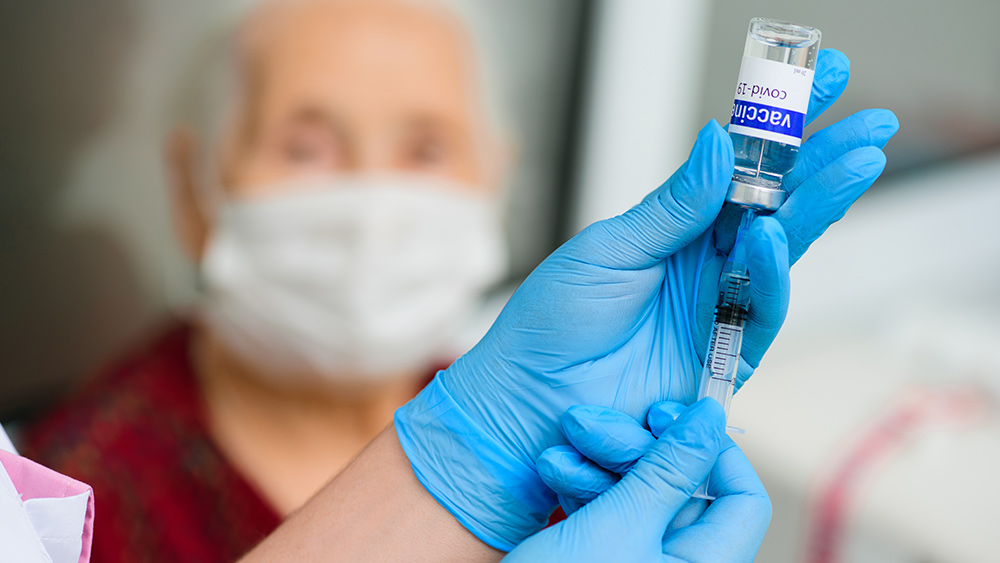MEDICAL CANNIBALISM: Aborted fetal tissue is routinely used in coronavirus vaccines to “code” spike proteins
02/02/2021 / By Ethan Huff

LifeSiteNews co-founder John-Henry Westen sat down with vaccine researcher Pamela Acker the other day to discuss the contents of Wuhan coronavirus (COVID-19) vaccines, not the least of which include ingredients derived from aborted human babies.
Acker revealed that China virus vaccines contain what are known as HEK-293 cells, which come from human embryonic kidneys. The coronavirus vaccines from Moderna and Pfizer, which contain messenger RNA (mRNA) technology, were both developed using HEK-293 cells.
HEK-293 cells were used to develop the mRNA codes that create “spike” proteins for the Chinese virus. They were also used in the testing phases of the two vaccines, as this is “a lot less expensive and dangerous than testing it in a human being,” Acker says.
“mRNA is messenger RNA,” Acker explained. “It’s the nucleic acid that’s a copy that’s made of your DNA, and then it’s sent out to the ribosomes in the cells and protein is produced using that messenger copy.”
“So, what the vaccine reports do is take messenger RNA that codes for the spike protein of coronavirus and insert that into your cells so that your human cells will then make the spike protein from the coronavirus.”
Because injecting spike proteins directly would not work so well because they tend to degrade, the idea is to genetically engineer cells, via the vaccine, to produce these spike proteins on their own.
“The thought is that if your body’s making it itself, then you can get a prolonged enough exposure to the spike protein that you’ll be able to mount an immune response to it,” Acker says, adding that these artificial spike proteins were tested in HEK-293 cells.
Testing with aborted baby cell lines is “ongoing” in vaccine production, Acker says
Some Christian organizations such as Focus on the Family have tried to justify the use of these cell lines, claiming that no new babies had to be aborted in order for coronavirus vaccines to be developed. This may not actually be the case, however.
According to Acker, testing processes with HEK-293 cells “may actually be ongoing in the production of these vaccines” – meaning it is not a one and done situation in terms of how vaccine corporations utilize these aborted baby body parts.
“So, there’s a whole industry based on these aborted fetal cells in basic science research that I think people aren’t super familiar with,” Acker warns.
For every new batch of coronavirus vaccines that is “tested” prior to release, more HEK-293 cell lines are used, Acker says.
“That is not published in the literature per se, because none of the data post the initial clinical trials has been published, but there’s substantial reason to think that this is going on,” she added.
Contrary to what some have been falsely led to believe, these and other aborted baby cell lines did not just come from one baby that was killed back in the 1970s. Aborted baby body parts continue to be harvested and turned into cell lines for the development of vaccines and other pharmaceuticals.
“There’s WI-38, MRC-5, HEK-293, PER.C6, and there’s another one that I’m forgetting the name of that was developed in 2015 that’s not currently being used in any vaccines, but has a potential to be used in vaccines and is used in other therapeutic treatments,” Acker says.
“So, there’s a number of these cell lines that are currently being used to develop a variety of therapeutics, everything from vaccines to treatments for cystic fibrosis.”
Be sure to check out the full interview between Westen and Acker at LifeSiteNews.
More of the latest news about the Wuhan coronavirus (COVID-19) can be found at Pandemic.news.
Sources for this article include:
Tagged Under: aborted fetal tissue, abortions, coronavirus, covid-19, fetal tissue, HEK-293, mRNA, Pamela Acker, spike proteins, vaccination, vaccine ingredients, vaccine injury, vaccines
RECENT NEWS & ARTICLES
VaccineDamage.News is a fact-based public education website published by Vaccine Damage News Features, LLC.
All content copyright © 2018 by Vaccine Damage News Features, LLC.
Contact Us with Tips or Corrections
All trademarks, registered trademarks and servicemarks mentioned on this site are the property of their respective owners.





















